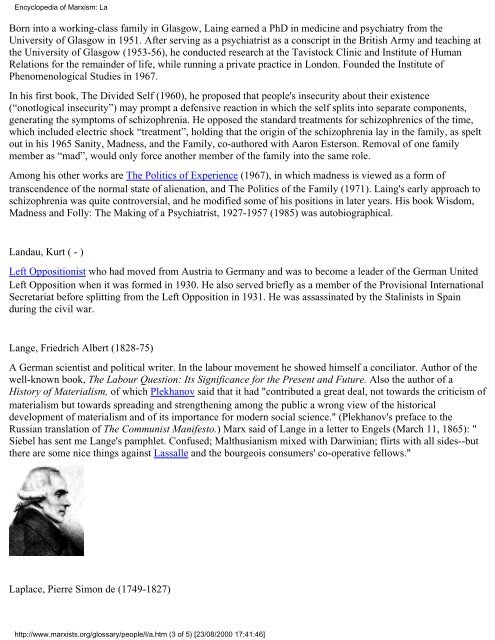Socialism: Utopian and Scientific - MIA
Socialism: Utopian and Scientific - MIA
Socialism: Utopian and Scientific - MIA
Create successful ePaper yourself
Turn your PDF publications into a flip-book with our unique Google optimized e-Paper software.
Encyclopedia of Marxism: LaBorn into a working-class family in Glasgow, Laing earned a PhD in medicine <strong>and</strong> psychiatry from theUniversity of Glasgow in 1951. After serving as a psychiatrist as a conscript in the British Army <strong>and</strong> teaching atthe University of Glasgow (1953-56), he conducted research at the Tavistock Clinic <strong>and</strong> Institute of HumanRelations for the remainder of life, while running a private practice in London. Founded the Institute ofPhenomenological Studies in 1967.In his first book, The Divided Self (1960), he proposed that people's insecurity about their existence(“onotlogical insecurity”) may prompt a defensive reaction in which the self splits into separate components,generating the symptoms of schizophrenia. He opposed the st<strong>and</strong>ard treatments for schizophrenics of the time,which included electric shock “treatment”, holding that the origin of the schizophrenia lay in the family, as speltout in his 1965 Sanity, Madness, <strong>and</strong> the Family, co-authored with Aaron Esterson. Removal of one familymember as “mad”, would only force another member of the family into the same role.Among his other works are The Politics of Experience (1967), in which madness is viewed as a form oftranscendence of the normal state of alienation, <strong>and</strong> The Politics of the Family (1971). Laing's early approach toschizophrenia was quite controversial, <strong>and</strong> he modified some of his positions in later years. His book Wisdom,Madness <strong>and</strong> Folly: The Making of a Psychiatrist, 1927-1957 (1985) was autobiographical.L<strong>and</strong>au, Kurt ( - )Left Oppositionist who had moved from Austria to Germany <strong>and</strong> was to become a leader of the German UnitedLeft Opposition when it was formed in 1930. He also served briefly as a member of the Provisional InternationalSecretariat before splitting from the Left Opposition in 1931. He was assassinated by the Stalinists in Spainduring the civil war.Lange, Friedrich Albert (1828-75)A German scientist <strong>and</strong> political writer. In the labour movement he showed himself a conciliator. Author of thewell-known book, The Labour Question: Its Significance for the Present <strong>and</strong> Future. Also the author of aHistory of Materialism, of which Plekhanov said that it had "contributed a great deal, not towards the criticism ofmaterialism but towards spreading <strong>and</strong> strengthening among the public a wrong view of the historicaldevelopment of materialism <strong>and</strong> of its importance for modern social science." (Plekhanov's preface to theRussian translation of The Communist Manifesto.) Marx said of Lange in a letter to Engels (March 11, 1865): "Siebel has sent me Lange's pamphlet. Confused; Malthusianism mixed with Darwinian; flirts with all sides--butthere are some nice things against Lassalle <strong>and</strong> the bourgeois consumers' co-operative fellows."Laplace, Pierre Simon de (1749-1827)http://www.marxists.org/glossary/people/l/a.htm (3 of 5) [23/08/2000 17:41:46]














![tyf Enf=O=n]lgg](https://img.yumpu.com/47584932/1/190x245/tyf-enfonlgg.jpg?quality=85)

